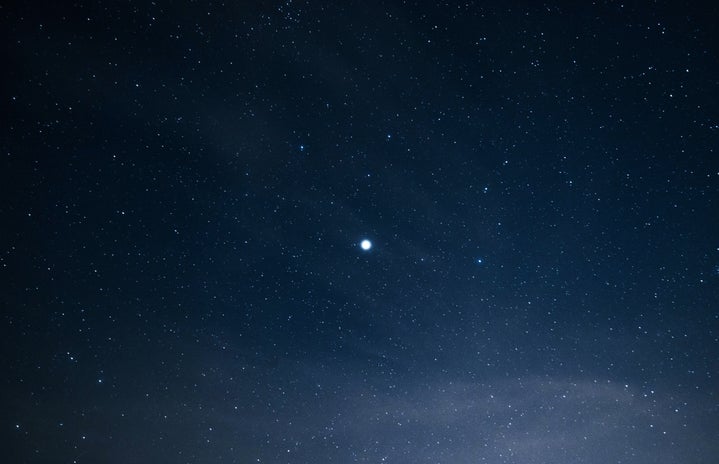This year’s Ramadan celebration during the COVID-19 pandemic was unlike any other. A time when people normally gather with friends at extravagant iftar parties with tables of food suddenly became much quieter as I now cook and prepare meals with just my immediate family. A time when the Masjids were packed with its congregation of men and women praying behind the Imam suddenly turned into empty masjid halls with fathers and brothers taking the lead on prayers at home. A time when I was overcome with stress over AP exams coinciding with Ramadan suddenly turned into more time for me to study the traditions and beautiful meanings of Ramadan.
A quarantine Ramadan allowed me to reflect on the true meaning of celebrating Ramadan, beyond the external practices of feeling hungry and eating to the personal growth and connection to spirituality.
Waking before sunrise to nourish our bodies
The sliver of the crescent moon emerging in the night. Its light penetrates the darkness; the sign of a most blessed month to come.
Ramadan.
Everywhere darkness has fallen. Lights flicker off as everyone prepares for their slumber. Windows blackened, eyes resting, all but mine. Awake, deep in the night, a time of darkness and secrecy.
I gather with my family at 3:40 a.m. to eat our pre-dawn meal in preparation for the 16-hour fast. My mother scoops out the boiled eggs from the pot while my father cuts up melons, spilling the sticky juice on the counter. My sister and I set the table with mugs of warm milk and a plate of sweet dates. Together we eat, struggling to fight fatigue. My mother continues to pour more water and my father towers our plates with eggs and bread.
This Ramadan, we were not rushed to quickly finish our pre-dawn meals so we could jump back in bed to try to get a good night’s rest before the 6 a.m. call to school. This time, I chew slowly and let the water linger in my mouth. This pre-dawn meal is a blessing. It is not just another rule in the books of Ramadan we blindly follow. Rather, I understand that this meal is to nourish us for the physically draining day in hopes of strengthening our spiritual connection.
The start of daybreak is accompanied by the dawn prayer. I engage in deep reflection in a world far from here as the moon, in its magnificent glow shines the light ahead of me.
The day is a time to be grateful
The sun is up; daylight streams around me. It is in this month we fight to eradicate the lustful temptations of lying, cheating, and gossiping. We also must hold back our frustration and anger. This can be difficult to do on a typical Ramadan fasting at school when we’re tempted to cheat because that test is worth half our grade. Or when we can’t hold back making a rude comment about that girl. This Ramadan, I keep good company over Facetime, which reminds me to stay positive.
This Ramadan, I also realize as the day passes alongside me; daylight mocks my thirst and hunger but it actually aids my patience and gratitude. Instead of complaining about the heat and my cravings, I think about how many people in the world know nothing but hunger. I know I can rest my eyes and silence the rumbling of my stomach. But I don’t focus on the relief I will have later. I immerse myself in my burning throat. I tremble from the pain of hunger, but I also smile at the pleasure of control.
Reflecting on discipline at sundown
On a typical Ramadan, I would probably be studying for AP exams after school and barely notice the quickly approaching sundown. This Ramadan, I make a conscious decision to reflect the 10 minutes before sundown.
It is close to sundown, and now I am a beggar, desperate for food and water to survive. My body is dependent on the gifts of food and water — without them, I would cease to live. And yet, I can control myself these 16 hours. My throat is pleading for water, just a cool sip. My stomach is roaring, begging for food, just one bite.
But I silence those entreating voices. If I can refrain myself from my basic needs, surely I can let go of many of my bad habits. I can stop myself from scrolling through Instagram for hours and instead manage my time. I can stop myself from making a snarky comment about my sister and instead listen to her. I can stop myself from engaging in rumors about a girl in my class and instead steer the conversation to a different topic. I can make these choices.
Darkness has once more befallen. Finally, I am blessed with a sweet date and a sip of water. Sundown also marks the evening prayer, Maghrib. In my prayers, I supplicate for an accepted fast and to reap the blessings of this month. Food and water may nourish the body, but discipline and gratitude fulfill the soul.
A lively night towards light
In previous Ramadans falling during the school year, I would have to wrap up my prayers quickly so I could go to bed. This Ramadan, however, I stand in prayer in the depths of the night and see the moon light up our path for this month. While the night is a time of rest, for us the night comes to life with prayer, reflection, and repentance. The moonlit path is our guidance in the darkness towards a cleansed soul.
A celebration of new beginnings
One last time, on the 30th night, we search for the moon, this time for the end of Ramadan. The moon of Shawwal marks our blessed holiday, Eid ul Fitr.
Eid has always been a joyous day beginning with listening to the Imam for the Eid prayer at the Masjid. His sermons have always excited me for a blessed day ahead of us, a celebration for a completed Ramadhan.
We shout Eid Mubarak!
We would usually go to a large party hall and meet with close friends. We would stuff our faces with food and laugh until our stomachs hurt.
This year, celebrating Eid meant Facetime calls with family and merely seeing friends from our car windows. This Ramadan allowed me to see past the parties. In past years when Ramadan ended, all of our traditions and habits also ended. We became careless of our physical health and we stopped eating together as a family. As a community, we let loose our tongues. When the parties began, the gossiping and arguing started again. We seemed to have forgotten all of our efforts to control our actions and strive towards good character. This year I am much more aware of my actions: I make sure to help my mom in the kitchen, I decide against picking a fight with my sister, and I remind all of us to smile more.
This Ramadan has shown me I have control over my life.


